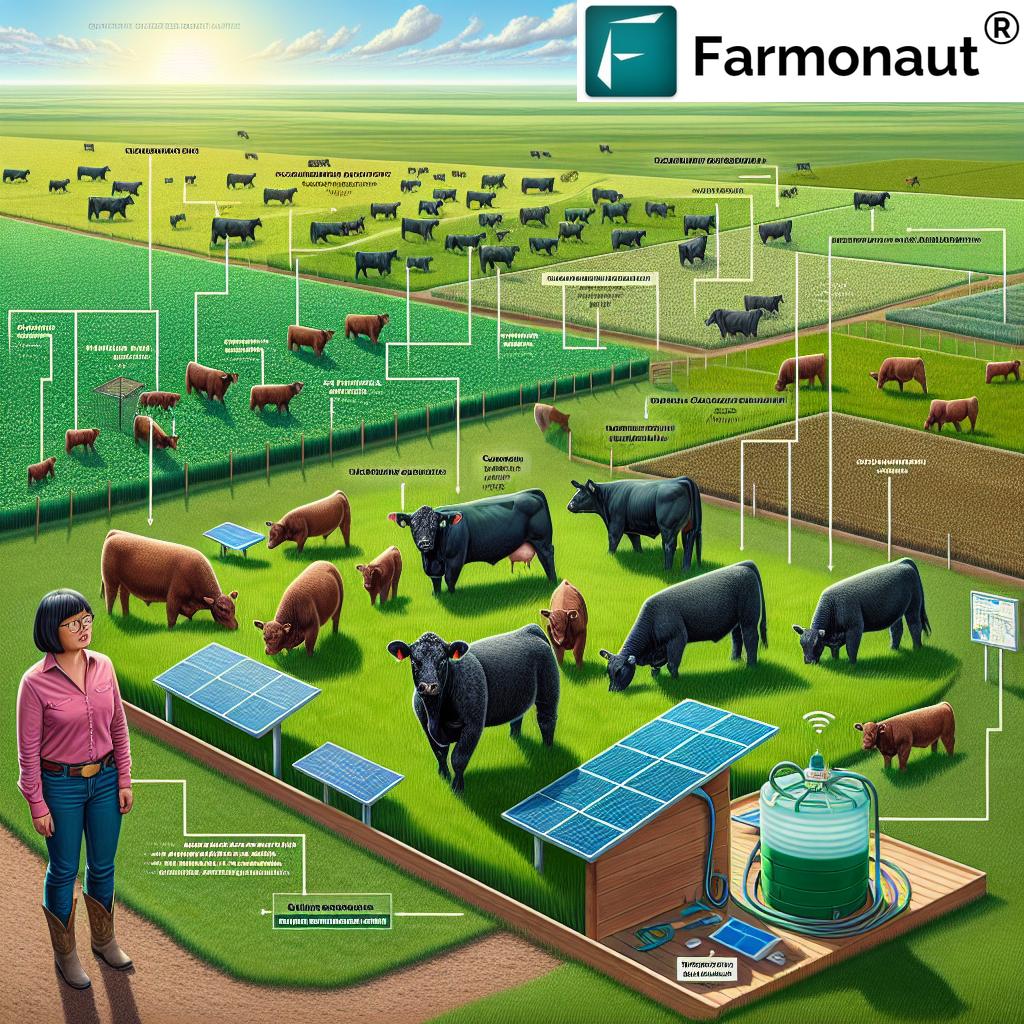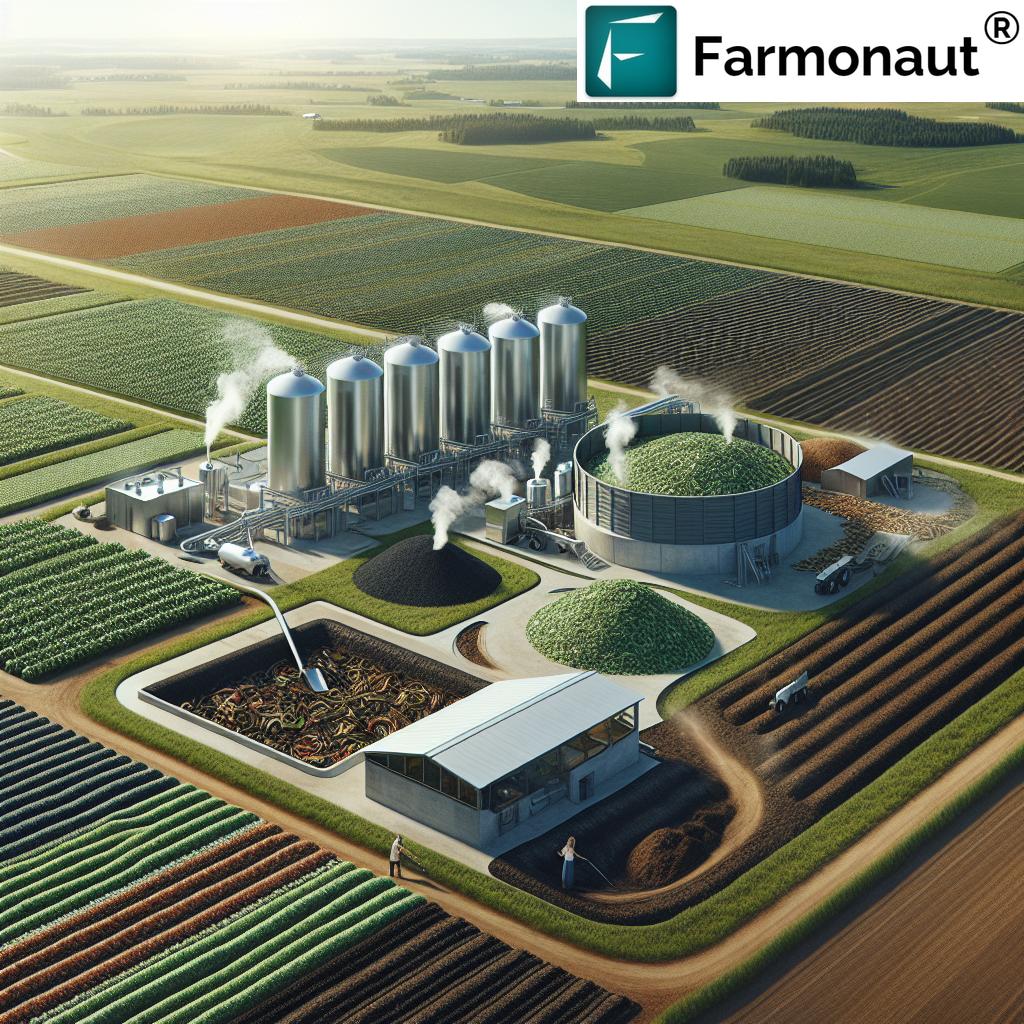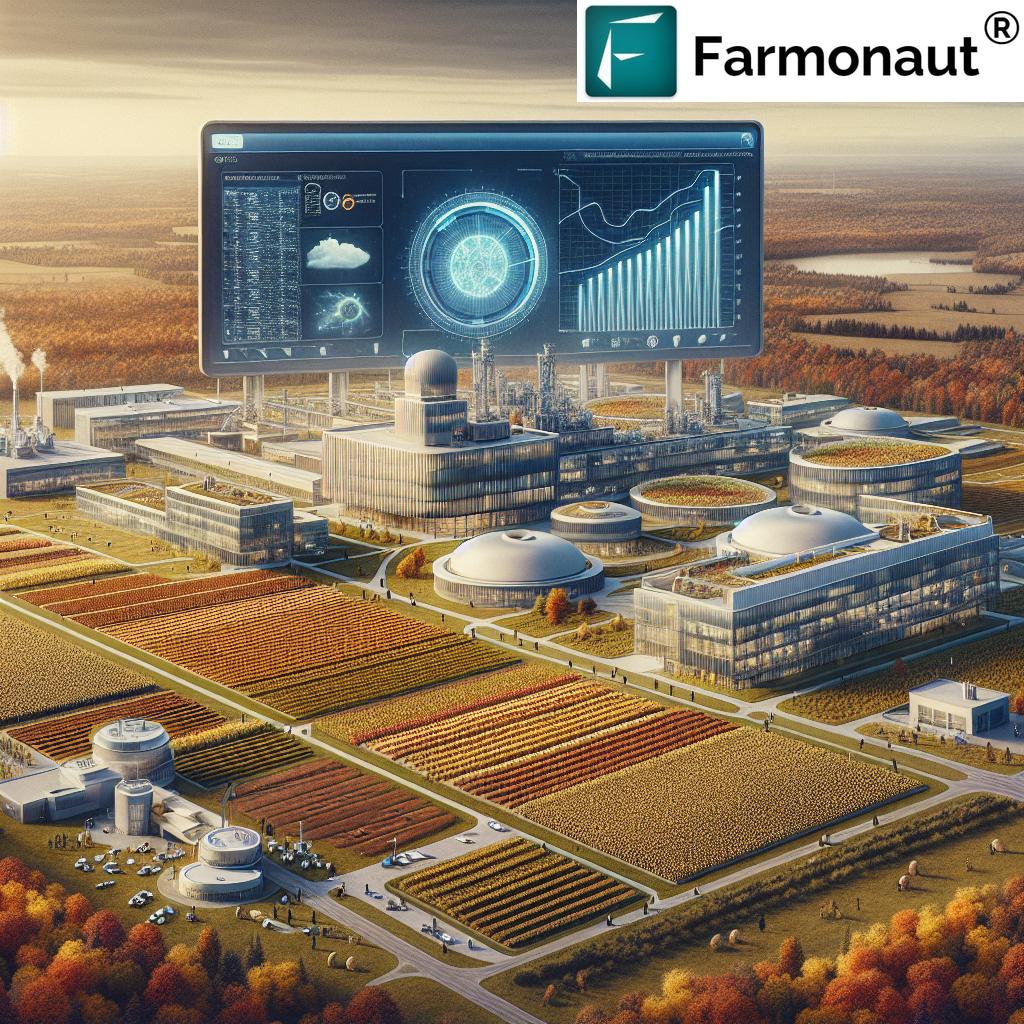Revitalizing Canada’s Tomato Industry: Precision Agriculture’s Role in Leamington’s Food Processing Innovation
“Leamington’s century-old tomato production facility is poised for revival, potentially impacting thousands of jobs in rural communities.”
Welcome to an exciting journey through the heart of Canada’s agricultural revolution! In this comprehensive blog post, we’ll explore how precision agriculture technology is breathing new life into Leamington’s food processing industry, particularly in the tomato sector. As we delve into this fascinating topic, we’ll uncover the innovative strategies and cutting-edge technologies that are shaping the future of farming and food production in this historic region.
The Renaissance of Leamington’s Tomato Industry
Leamington, often referred to as the “Tomato Capital of Canada,” has long been synonymous with tomato production. However, recent years have seen challenges in this sector, prompting a need for innovation and revitalization. The potential revival of a century-old tomato production facility marks a pivotal moment in the industry’s evolution, promising to rejuvenate rural communities and bolster the local economy.
At the forefront of this agricultural renaissance is precision agriculture technology. This innovative approach to farming is revolutionizing how we grow, harvest, and process crops, particularly tomatoes in the Leamington area. By leveraging advanced technologies such as satellite imagery, AI-driven analytics, and IoT devices, farmers and food processors are optimizing their operations like never before.
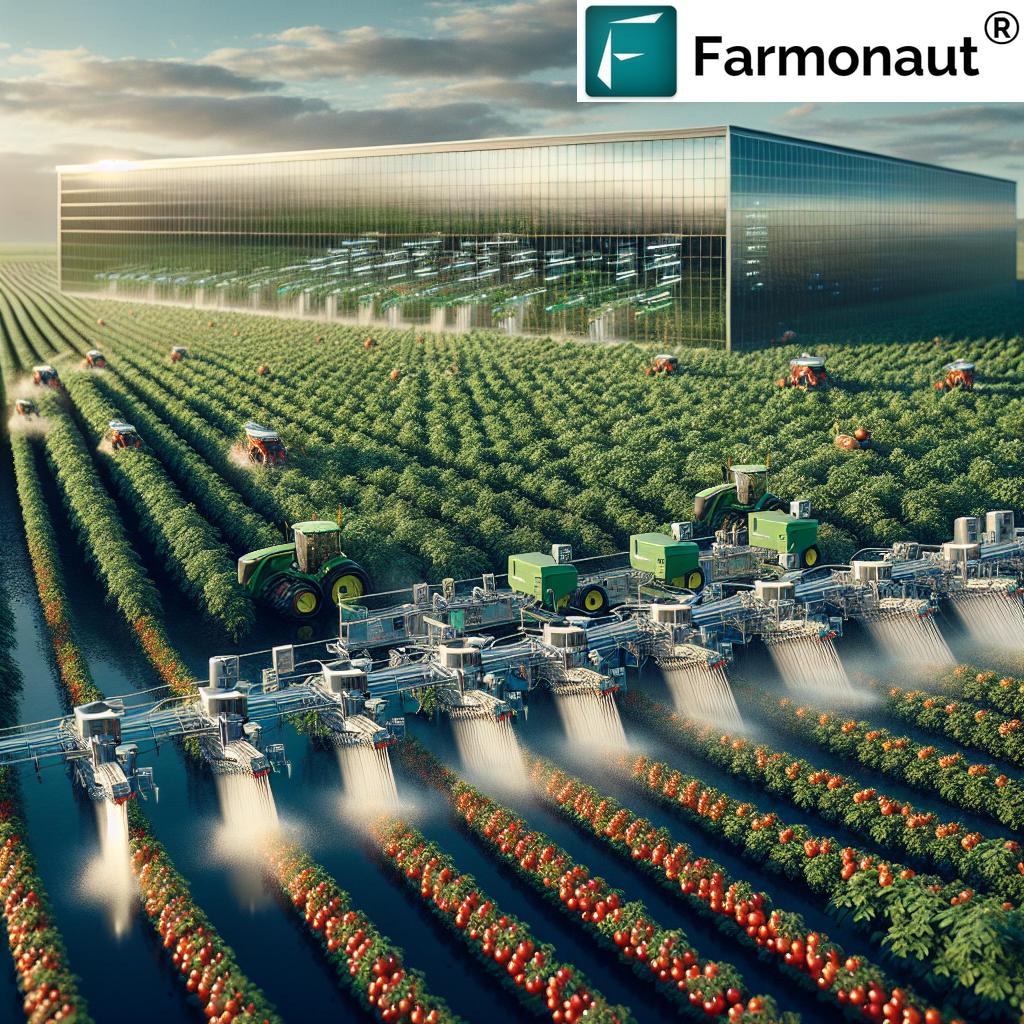
The Role of Precision Agriculture in Tomato Production
Precision agriculture is not just a buzzword; it’s a game-changer for the tomato industry in Leamington. Here’s how this technology is making a significant impact:
- Crop Yield Optimization: By utilizing satellite-based crop health monitoring, farmers can precisely track the growth and health of their tomato plants. This real-time data allows for timely interventions, resulting in improved yields and quality.
- Resource Management: Precision irrigation systems and smart fertilizer application techniques help conserve water and reduce chemical usage, leading to more sustainable farming practices.
- Pest and Disease Control: Advanced imaging technologies can detect early signs of pest infestations or diseases, enabling targeted treatments and reducing crop losses.
- Harvest Timing: AI-powered predictive analytics help farmers determine the optimal time for harvesting, ensuring peak flavor and nutritional value of tomatoes.
These advancements are not just benefiting individual farmers; they’re transforming the entire food processing industry in Leamington. The integration of precision agriculture with food processing facilities is creating a more efficient, sustainable, and productive agricultural ecosystem.
Innovative Crop Yield Optimization Strategies
One of the key areas where precision agriculture is making a significant impact is in crop yield optimization. In Leamington’s tomato industry, several innovative strategies are being employed:
- Data-Driven Decision Making: Farmers are now using sophisticated data analytics platforms to make informed decisions about planting, fertilizing, and harvesting. These platforms, like the one offered by Farmonaut, combine satellite imagery, weather data, and historical yield information to provide actionable insights.
- Variable Rate Technology (VRT): This technology allows for precise application of inputs like water, fertilizers, and pesticides based on the specific needs of different areas within a field. For tomato crops, this means optimized growth conditions across the entire plantation.
- Precision Planting: Advanced planting equipment guided by GPS ensures optimal seed spacing and depth, leading to improved germination rates and overall plant health.
- Drone-Assisted Monitoring: Drones equipped with multispectral cameras provide detailed aerial views of tomato fields, helping identify areas that need attention long before issues become visible to the naked eye.
These strategies are not just theoretical; they’re being put into practice in Leamington’s fields, resulting in tangible improvements in tomato yields and quality.
Sustainable Farming Practices in Tomato Production
Sustainability is at the heart of the agricultural revolution in Leamington. The tomato industry is embracing a range of sustainable farming practices, many of which are enabled or enhanced by precision agriculture technologies:
- Water Conservation: Precision irrigation systems, guided by soil moisture sensors and weather forecasts, ensure that tomato plants receive exactly the amount of water they need, reducing waste and conserving this precious resource.
- Reduced Chemical Usage: By precisely targeting areas that need treatment, farmers can significantly reduce the use of pesticides and herbicides, minimizing environmental impact and producing healthier tomatoes.
- Soil Health Management: Advanced soil testing and mapping technologies allow for targeted soil amendments, promoting long-term soil health and reducing the need for synthetic fertilizers.
- Energy-Efficient Practices: From solar-powered irrigation systems to energy-efficient greenhouses, the tomato industry is reducing its carbon footprint through innovative technologies.
These sustainable practices not only benefit the environment but also contribute to the production of higher-quality tomatoes, meeting the growing consumer demand for sustainably grown produce.
“Precision agriculture technologies can increase crop yields by up to 30% while reducing water usage by 20-50%.”
Cutting-Edge Irrigation Systems for Tomato Crops
Efficient water management is crucial in tomato production, and Leamington’s farmers are at the forefront of implementing cutting-edge irrigation systems. These advanced systems are transforming how water is used in tomato fields:
- Drip Irrigation: This precise method delivers water directly to the plant roots, minimizing evaporation and ensuring optimal water usage.
- Smart Irrigation Controllers: These devices use real-time weather data and soil moisture readings to automatically adjust watering schedules, preventing over or under-watering.
- Subsurface Drip Irrigation: By placing irrigation lines below the soil surface, this method reduces water loss and promotes deeper root growth in tomato plants.
- Precision Mobile Drip Irrigation: This innovative system combines the efficiency of drip irrigation with the flexibility of center pivot systems, ideal for larger tomato farms.
These irrigation innovations are not just conserving water; they’re also improving the quality and yield of tomatoes by ensuring consistent and optimal moisture levels throughout the growing season.
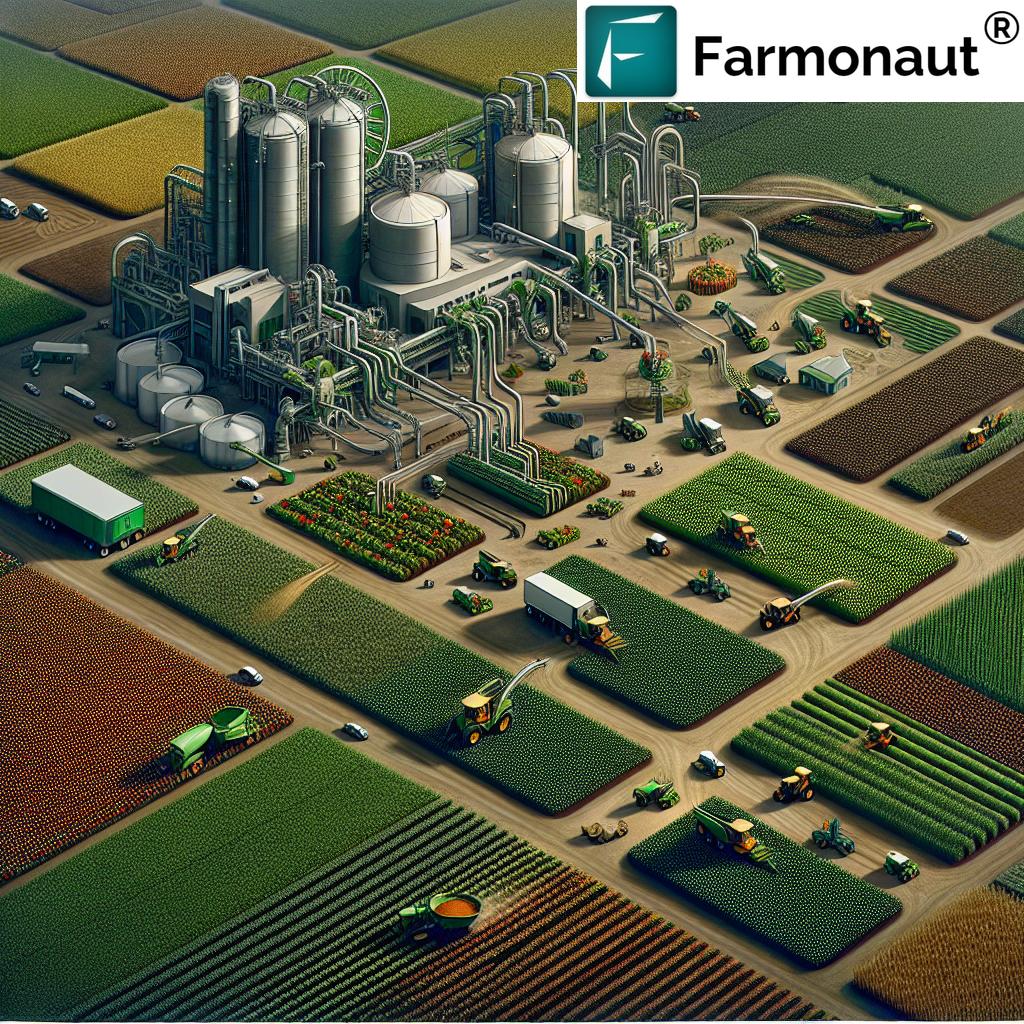
Farm Equipment Modernization in Leamington
The modernization of farm equipment is playing a crucial role in the revitalization of Leamington’s tomato industry. Here’s how advanced machinery is transforming tomato farming:
- GPS-Guided Tractors: These high-precision vehicles ensure accurate planting and cultivation, reducing overlap and improving efficiency.
- Automated Harvesting Machines: Specialized tomato harvesters use sensors and AI to identify ripe fruits and harvest them gently, increasing efficiency and reducing labor costs.
- Robotic Weeders: These machines use computer vision to distinguish tomato plants from weeds, precisely removing unwanted growth without damaging the crop.
- Sensor-Equipped Sprayers: These advanced sprayers can detect the presence and density of foliage, applying pesticides and fertilizers with pinpoint accuracy.
This modernization of farm equipment is not just about efficiency; it’s about precision. By using these advanced tools, Leamington’s tomato farmers can manage their crops with unprecedented accuracy, leading to better yields and higher-quality produce.
Agricultural Policy Impact on Leamington’s Rural Communities
The revival of Leamington’s tomato industry is not happening in isolation. Agricultural policies play a crucial role in shaping the landscape of rural communities. Here’s how policy decisions are influencing the sector:
- Support for Precision Agriculture: Government initiatives promoting the adoption of precision agriculture technologies are helping farmers transition to more efficient and sustainable practices.
- Rural Development Programs: Policies aimed at revitalizing rural areas are providing support for infrastructure improvements and community development, essential for sustaining a thriving agricultural sector.
- Trade Policies: International trade agreements impact the market for Canadian tomatoes, influencing production decisions and industry growth.
- Environmental Regulations: Policies promoting sustainable farming practices are encouraging the adoption of environmentally friendly technologies in tomato production.
These policies are not just impacting farmers; they’re reshaping entire rural communities, creating new job opportunities and fostering economic growth in the region.
The Impact on Local Economies and Job Markets
The revitalization of Leamington’s tomato industry through precision agriculture is having a profound impact on the local economy and job market:
- Job Creation: The integration of new technologies is creating demand for skilled workers in areas such as data analysis, agricultural technology, and precision equipment operation.
- Economic Diversification: As the tomato industry evolves, it’s spawning related businesses in areas like ag-tech development, equipment manufacturing, and specialized agricultural services.
- Increased Productivity: Higher yields and more efficient production methods are boosting the overall economic output of the region.
- Attracting Investment: The innovative approach to agriculture is drawing new investments into the area, further stimulating economic growth.
This economic transformation is not just about numbers; it’s about creating sustainable livelihoods and revitalizing rural communities that have long been the backbone of Canada’s agricultural sector.
Agribusiness Restructuring Strategies in Leamington
The tomato industry in Leamington is undergoing significant restructuring to adapt to new technologies and market demands. Key strategies include:
- Vertical Integration: Many tomato producers are integrating processing facilities into their operations, gaining more control over the value chain.
- Collaborative Partnerships: Farmers are forming cooperatives and partnerships to share resources and leverage advanced technologies that might be too costly for individual farms.
- Diversification: Some agribusinesses are expanding beyond tomatoes, using precision agriculture techniques to cultivate a wider range of crops.
- Direct-to-Consumer Models: Leveraging digital platforms, some producers are establishing direct connections with consumers, offering fresh, locally-grown tomatoes and related products.
These restructuring strategies are not just about survival; they’re about positioning Leamington’s tomato industry for long-term success in a rapidly evolving agricultural landscape.
The Role of Technology in Modern Tomato Farming
Technology is at the heart of the transformation in Leamington’s tomato industry. Here’s how various technological innovations are being applied:
- AI and Machine Learning: These technologies are being used for predictive analytics in crop management, helping farmers make data-driven decisions about planting, fertilizing, and harvesting.
- Internet of Things (IoT): Sensors placed throughout tomato fields collect real-time data on soil conditions, weather, and plant health, allowing for precise management of growing conditions.
- Blockchain Technology: Some producers are using blockchain to enhance traceability in their supply chains, providing consumers with detailed information about the origin and journey of their tomatoes.
- Robotics: Automated systems are being employed for tasks like planting, weeding, and harvesting, increasing efficiency and reducing labor costs.
These technological advancements are not just improving efficiency; they’re fundamentally changing how tomatoes are grown, harvested, and brought to market in Leamington.
The Future of Tomato Production in Leamington
As we look to the future, the tomato industry in Leamington is poised for continued innovation and growth. Here are some trends and developments we can expect to see:
- Increased Automation: More aspects of tomato production, from planting to processing, will likely become automated, further improving efficiency and consistency.
- Personalized Nutrition: Advanced genetics and precision growing techniques may lead to tomatoes tailored for specific nutritional profiles or culinary uses.
- Climate-Resilient Varieties: As climate change continues to impact agriculture, we can expect the development of tomato varieties that are more resistant to extreme weather conditions.
- Vertical Farming: Urban areas near Leamington might see the rise of vertical tomato farms, bringing production closer to consumers and utilizing space more efficiently.
These developments promise to keep Leamington at the forefront of tomato production, ensuring its continued role as a key player in Canada’s agricultural sector.
Comparative Analysis: Traditional vs. Precision Agriculture in Tomato Farming
To better understand the impact of precision agriculture on Leamington’s tomato industry, let’s examine a comparative analysis of traditional farming methods versus precision agriculture techniques:
| Metrics | Traditional Farming Methods | Precision Agriculture Methods | Estimated Improvement (%) |
|---|---|---|---|
| Annual Tomato Yield (tons/acre) | 25 | 32 | 28% |
| Water Consumption (gallons/acre) | 500,000 | 350,000 | 30% |
| Fertilizer Usage (lbs/acre) | 1,000 | 750 | 25% |
| Pest Management Efficiency (% crop protected) | 70% | 90% | 28.6% |
| Labor Hours (hours/acre) | 200 | 150 | 25% |
| Overall Production Costs ($/acre) | 5,000 | 4,200 | 16% |
| Profit Margin (%) | 15% | 22% | 46.7% |
This table clearly illustrates the significant improvements that precision agriculture brings to tomato farming in Leamington. From increased yields to reduced resource usage and improved profit margins, the benefits are substantial and far-reaching.
The Role of Farmonaut in Precision Agriculture
In the context of Leamington’s evolving tomato industry, platforms like Farmonaut play a crucial role in enabling precision agriculture. Farmonaut offers advanced, satellite-based farm management solutions that are particularly relevant to tomato farmers looking to optimize their operations.
Key features of Farmonaut that benefit tomato farmers include:
- Real-time Crop Health Monitoring: Using multispectral satellite imagery, Farmonaut provides insights into vegetation health (NDVI) and soil moisture levels, crucial for tomato crop management.
- AI-powered Advisory System: The Jeevn AI system offers personalized farm advice, including weather forecasts and crop management strategies tailored for tomato cultivation.
- Resource Management Tools: Farmonaut’s platform helps in optimizing the use of water, fertilizers, and other resources, which is essential for sustainable tomato farming.
By leveraging these technologies, tomato farmers in Leamington can make more informed decisions, leading to improved crop yields and more sustainable farming practices.
Explore Farmonaut’s solutions:
Frequently Asked Questions
Q: How is precision agriculture impacting tomato yields in Leamington?
A: Precision agriculture is significantly improving tomato yields in Leamington by optimizing resource use, enhancing crop health monitoring, and enabling data-driven decision-making. Farmers using these technologies are seeing yield increases of up to 30%.
Q: What role does sustainable farming play in Leamington’s tomato industry revival?
A: Sustainable farming practices are crucial to the revival of Leamington’s tomato industry. They help reduce environmental impact, conserve resources, and meet growing consumer demand for sustainably produced food, all while improving long-term productivity and profitability.
Q: How are new technologies affecting job markets in Leamington’s agricultural sector?
A: While some traditional farming jobs may be changing, new technologies are creating opportunities in areas such as data analysis, agricultural technology management, and precision equipment operation. This is leading to a more diverse and skilled agricultural workforce in Leamington.
Q: What are the main challenges in adopting precision agriculture for tomato farming?
A: The main challenges include the initial investment costs, the need for technical skills and training, and ensuring reliable connectivity in rural areas. However, the long-term benefits often outweigh these initial hurdles.
Q: How is the food processing industry in Leamington adapting to these agricultural innovations?
A: The food processing industry is adapting by integrating more automated and efficient processing technologies, improving traceability systems, and developing new products that capitalize on the higher quality and consistency of precision-grown tomatoes.
Conclusion
The revitalization of Leamington’s tomato industry through precision agriculture is a testament to the power of innovation in transforming traditional sectors. By embracing cutting-edge technologies and sustainable practices, Leamington is not just preserving its legacy as the “Tomato Capital of Canada” but is also charting a course for the future of agriculture.
From advanced irrigation systems to AI-driven crop management, the changes we’re seeing in Leamington are microcosms of a broader agricultural revolution. These innovations are not just about producing more tomatoes; they’re about creating a more sustainable, efficient, and resilient food system.
As we look to the future, it’s clear that the integration of precision agriculture in Leamington’s tomato industry will continue to drive growth, create new opportunities, and ensure that this historic agricultural region remains at the forefront of innovation for years to come.
For those interested in exploring how precision agriculture can benefit their farming operations, platforms like Farmonaut offer valuable tools and insights. By leveraging these technologies, farmers can play a part in shaping the future of agriculture, not just in Leamington, but across Canada and beyond.
For more information on Farmonaut’s API and developer resources, visit:
As we continue to witness the transformation of Leamington’s tomato industry, it’s clear that the future of agriculture is here, and it’s precision-driven, sustainable, and more productive than ever before.





